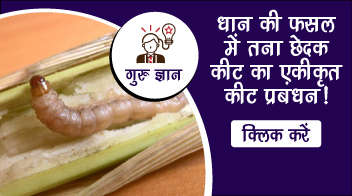
Guru GyaanAgroStar Agronomy Centre of Excellence
Integrated Management of Rice stem borer (IPM)
• The incidence is more under warm weather condition.
• Larva enters into the plant near the internode by making a hole and feed inside.
• The main shoot is dried of over a time and it is called as “Dead heart”.
• If infestation is observed after the emergence of panicle, it turn into white colour and grains do not fill up which is known as “White ear”.
• Such damaged dead hearts or white ears are easily pulled out.
• Rice varieties such as Narmda, GR 102, IR 22, IR 66, Gurjari, CR 138-928 and GR 12 are resistant varieties, select resistant varieties.
• Transplant paddy seedlings during the first fortnight of July.
• Apply recommended nitrogenous fertilizers in a split dose.
• Instead of using urea, use ammonium sulphate fertilizer to reduce the infestation.
• Apply chlorantraniliprole 0.4 GR or carbofuran 3G or cartap hydrochloride 4G or fipronil 0.3 GR @ 1 kg per 100 sq. m. area of rice nursery at 15 days after seeding. Mix with the sand and broadcast in the nursery.
• Cut the tips of seedling before transplanting.
• As the larvae hiding in the stem, the granular insecticides remains more effective.
• To attract the adults of pest, install pheromone traps.
• If possible, also install one light trap in rice field.
• Preventive measures should be taken when the infestation of this pest is 10% before the emergence of panicles and 5% after emergence of panicles.
• Apply chlorantraniliprole 0.4 GR or cartap hydrochloride 4G @ 10 kg or fipronil 0.3 GR @ 20-25 kg per hectare two times, first on initiation of pest or 30-35 days after transplanting and second at 15-20 days after first application in rice field.
• Apply these granules only in the infested area.
• In addition, spray chlorantraniliprole 18.5 SC @ 3 ml or flubendiamide 20 WG @ 2.5 g or fipronil 80 WG @ 1 g or flubendiamide 4% + buprofezin 20% SC @ 10 ml per 10 lit of water.
• Prompt disposal of paddy stubbles just after the harvesting of the crop.
Source:Agrostar Agronomy Centre of Excellence
If you find this information useful, like it and share it with all your friends.
18
9

